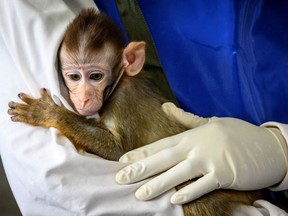WHO spokesperson Dr Margaret Harris warned people against attacking monkeys during pandemic
Article Author:
Bloomberg News
Madison Muller

(Bloomberg) — The World Health Organization has issued a public order to change its name. people are asking for help. Monkeypox virus is part of an ongoing effort to discourage harmful misconceptions associated with its current name.
"WHO is holding a public consultation on a new name for monkeypox. Anyone who wants to propose a new name can do so," the organization said in a statement.
At a press conference in Geneva on 9 August,WHO spokesperson Dr Margaret Harris urged people not to attack monkeys during an outbreak. warned.
"What people need to know is that the contagion we are seeing is happening among humans," she said.
-

What does monkeypox look like?
-

Monkeypox is the highest concern among young people: poll {71
Brazilian news media G1 reported that at least 10 monkeys were either showing signs of poisoning or had been harmed. Seven of them were rescued and died while the others were being monitored at a zoo in Sao Jose do Rio Preto, State of São Paulo.
According to a report,Brazil's environmental military police believe that those responsible for the crime had a monkeypox scare.
"The concern is where in the human population the virus is infecting and what humans can do to protect themselves from contracting the virus and becoming infected," Harris said. said Mr. "Animals should not be attacked."
After convening a global expert group on 8 August, the WHO announced that her two prevalent variants of monkeypox Decided to change the name. Formerly called the Central African or Congo Basin clade and the West African clade, they are now officially called Clade I and Clade II, respectively. The group also determined that clade II he consisted of two distinct subclades.
Assigning names to viruses is usually under the jurisdiction of the WHO, which allows people to submit ideas through an online portal, according to the statement. The announcement comes nearly two months after the WHO said it was planning to rename the virus. This follows requests from international scientists and public health officials who said the current name fostered a harmful stigma.
In previous outbreaks, monkeypox was associated with rodents. Some local health departments have already called it by another name. For example, in Chicago, Public Health uses his MPV.
Since May, the outbreak has expanded to include more than 31,000 people worldwide, with the United States leading the way with the highest number of cases. The virus disproportionately affects men who have sex with men and is spread through close contact.
The monkeypox virus was discovered in 1958, before best practices for naming diseases and viruses were adopted, he said in a WHO statement. At the time, the major subspecies were named according to the area in which they were distributed, but this practice encourages discrimination, so it is no longer used.

Sign up to receive daily top stories from National Post, a division of Postmedia Network Inc.
Thank you for registering.
Sending welcome email. If you don't see it, please check your spam folder.
The next issue of NP Posted will arrive in your mailbox shortly.


